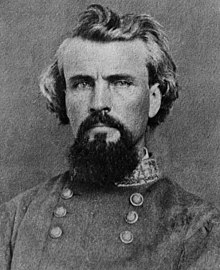Nathan Bedford Forrest
| Nathan Bedford Forrest | |
|---|---|
 |
|
| Nickname(s) | Old Bed Devil Forrest Wizard of the Saddle |
| Born |
July 13, 1821 Chapel Hill, Tennessee, U.S. |
| Died | October 29, 1877 (aged 56) Memphis, Tennessee, U.S. |
| Buried at | Health Sciences Park, Memphis, Tennessee, U.S. |
| Allegiance |
|
| Service/branch |
|
| Years of service | 1861–1865 |
| Rank |
|
| Unit | White's Company, TN Mounted Rifles |
| Commands held | 3rd Tennessee Cavalry Forrest's Cavalry Brigade Forrest's Cavalry Division Forrest's Cavalry Corps |
| Battles/wars | |
| Relations | |
Nathan Bedford Forrest (July 13, 1821 – October 29, 1877), called Bedford Forrest in his lifetime, was a lieutenant general in the Confederate Army during the American Civil War.
A cavalry and military commander in the war, Forrest is one of the war's most unusual figures. Although less educated than many of his fellow officers, before the war Forrest had already amassed a fortune as a planter, real estate investor, and slave trader. He was one of the few officers in either army to enlist as a private and be promoted to general officer and corps commander during the war. He created and established new doctrines for mobile forces, earning the nickname The Wizard of the Saddle. In their postwar writings, Confederate President Jefferson Davis and General Robert E. Lee both expressed their belief that the Confederate high command had failed to fully use Forrest's talents.
Ulysses S. Grant called him "that devil Forrest." Sherman, it is reported, considered him "the most remarkable man our civil war produced on either side." He was unquestionably one of the Civil War's most brilliant tacticians. Without military education or training, he became the scourge of Grant, Sherman, and almost every other Union general who fought in Tennessee, Alabama, or Kentucky. Forrest fought by simple rules: he maintained that "war means fighting and fighting means killing" and that the way to win was "to get there first with the most men." His cavalry, which Sherman reported in disgust "could travel one hundred miles in less time it takes ours to travel ten," secured more Union guns, horses, and supplies than any other single Confederate unit. He played pivotal roles at Fort Donelson, Shiloh, the capture of Murfreesboro, the Nashville campaign, Brice's Cross Roads, and in pursuit and capture of Streight's Raiders.
...
Wikipedia
